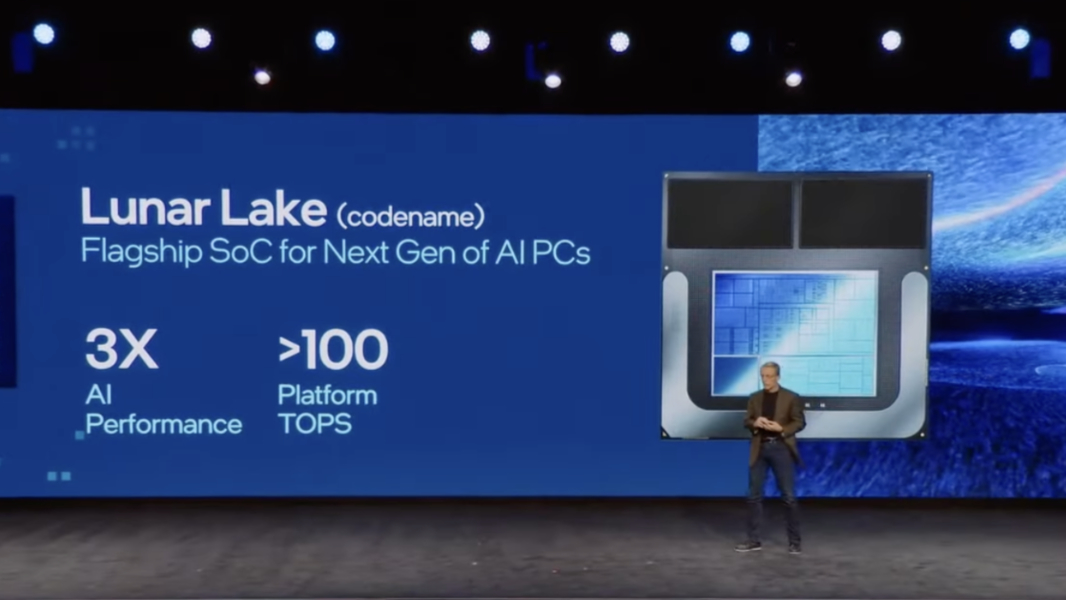Intel Claims Big AI Performance Gains in Next Core Ultra Chips
- Paul Thurrott
- Apr 09, 2024
-
6

At its Vision 2024 event today, Intel talked up AI acceleration for the enterprise. But the big focus outside the company was on a single slide onstage and a brief overview that promised to right the wrongs of Intel’s first-generation chipsets for AI PCs, the Core Ultra.
“Innovation is advancing at an unprecedented pace, all enabled by silicon – and every company is quickly becoming an AI company,” Intel CEO Pat Gelsinger said at the event. “Intel is bringing AI everywhere across the enterprise, from the PC to the data center to the edge. Our latest Gaudi, Xeon and Core Ultra platforms are delivering a cohesive set of flexible solutions tailored to meet the changing needs of our customers and partners and capitalize on the immense opportunities ahead.”
Windows Intelligence In Your Inbox
Sign up for our new free newsletter to get three time-saving tips each Friday — and get free copies of Paul Thurrott's Windows 11 and Windows 10 Field Guides (normally $9.99) as a special welcome gift!
"*" indicates required fields
Well, not exactly.
In the race to establish a beachhead for so-called AI PCs, it’s industry behemoth Intel—despite its branding partnership with Microsoft—that’s bringing up the rear. Where the Arm-based Qualcomm Snapdragon X Elite promises 45 TOPS of AI-accelerated NPU performance (and 75 TOPS across its CPU, GPU, and NPU) and the AMD Ryzen Hawk Point chipsets hit 16 TOPS of NPU performance, Intel’s first-generation Core Ultra chipsets—code-named Meteor Lake—deliver just 10 TOPS of AI accelerated performance.
And so it was quite interesting to see Gelsinger boast that its second-generation Core Ultra processors, code-named Lunar Lake and due in the second half of 2024, will deliver impressive AI-accelerated performance gains, with three times the performance of Meteor Lake.

“The road map is strong and in particular I’m quite excited about the next [Core Ultra] platform,” Mr. Gelsinger said, referring to Lunar Lake. “Where before competitors ship their first chips, we’re launching our second, Lunar Lake, [with] 3x the AI performance. This little marvel has over 100 platform TOPS [across CPU, GPU, and NPU], 45 NPU TOPS alone. And before others get started, we are on to the second generation, the third generation’s in fab … We’re going to drive the AI PC category to every fingertip of your users and your customers.”
Leaving aside the hyperbole in that statement—PCs based on the X Elite chipset will ship several months before Lunar Lake comes to market, and AMD is also promising a 3X AI-accelerated performance boost in its next-gen PC chipsets—Intel closing the AI performance gap this year is indeed important. And it could help level the playing field a bit, though PCs based on Qualcomm’s chipsets, in particular, will enable a MacBook Air-like experience that offers the performance of its rivals while being fanless and silent.
Intel also confirmed at Vision that it is working with Microsoft to enable Copilot to run in a hybrid configuration on AI PCs with both locally accelerated AI and cloud-based AI capabilities. And the Meteor Lake processors, despite their middling overall performance, are off to a good start, with 5 million PCs shipped so far and another 40 million units expected by the end of 2024. Intel had said previously that it expects to see about 100 million AI PCs in the market by the end of 2025.
Regardless of the relative TOPS scores of each chipset, the key to the success of the AI PC is software. And we’re hoping to learn more about locally accelerated AI-based apps and services in Windows 11 version 24H2 and from third parties at Microsoft Build in May.